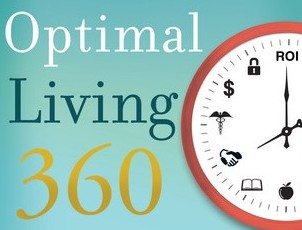By Jen Weigel
Chicago Tribune
Getting a return on your investment, or ROI, is important when it comes to your finances. But have you ever kept tabs on the ROI of your life?
According to Dr. Sanjay Jain, it’s possible to make changes in your routine that will physically, spiritually, emotionally and intellectually maximize your life’s ROI.
“Everybody has the dream of getting married, having kids, having the white picket fence and a lot of money in the bank,” said Jain, a physician and author of the book “Optimal Living 360.” “But if one part of your life is collapsing, it can cause a chain reaction to all the other pieces and really throw you off balance.”
Jain, who lost his entire life savings “and then some” when he invested heavily in commercial real estate just before the market crashed in 2008, said the ROI of his life was low at best.
“I started gaining weight, I was not eating well, my cholesterol started going up and my sugars started going up and it all just came to a head,” Jain said. “That put a strain on my relationships, friends as well as family, and I sort of withdrew from everybody. You lose faith and ask, ‘Why is this happening to me?'”
After going through his downward spiral in 2009, Jain decided it was time to pick himself up and make some life changes. By 2011, he was keeping a notebook and doing research on what made him feel better.
“I started losing weight and felt energized and my whole outlook on life was improving, so I thought, ‘I need to write all this down so I share this with my two sons so they can read it when they grow up,'” he said. “That notebook grew and grew, and eventually, I realized I was writing a book.”
Here are what Jain describes as “life core assets,” organized by the acronym ASPIRES-assets, safety, physical, intellectual, relationships, economic and spiritual. These are Jain’s keys to maximizing your life’s ROI.
_Assets: “This is when people need to tap into their strengths and connect the dots. Everything is connected, so if one thing goes wrong, it affects everything else. When we do what we’re good at and what comes easily, we are more satisfied and more confident. Recognize what your strengths are and then find a way to tap into them. At the same time, we need to know what we aren’t good at and try to improve on our weaknesses. This will help with getting that balance.”
_Safety: “This is a big one that we often overlook and as a physician, I want to stress how important it is to be aware of things that can improve your safety. You can have everything going for you in life but one text when you’re driving can wipe everything out. We take our safety for granted. Pay attention to those little things _ when that flight attendant is telling you how to fasten your seat belts _ so if the time comes and you need it, that awareness can save your life.”
_Physical: “You need to stay focused and start small. Don’t try to change your lifestyle all at once because that’s not sustainable. Start with small changes in your diet. Bring healthy snacks to work. Drink more water. Walk 20 minutes a day. Take the stairs when you can. Reconsider portion control. You need to stay focused and go one day at a time.
buy kamagra polo online blackmenheal.org/wp-content/themes/twentytwentytwo/inc/patterns/en/kamagra-polo.html no prescription
”
_Intellectual: “To keep your mind sharp, sleep is essential. We use our bedroom as our office or the place to watch television but if you take those elements out of your sleeping space, this will help quiet your mind when we are trying to sleep. It’s like decluttering your brain.”
_Relationships: “Relationships are like an onion. Onions have a lot of layers, and that is what makes it rich. …What you put in is what you get out and you have to give in order to receive so you have to invest time into these relationships. Nurture them like a flower. It will wilt if you ignore it so keep watering that plant and it will thrive. It’s kind of like social media, if you don’t tweet for a while, people forget about you, so you have to play an active role in those relationships.”
_Economic: “Be honest with yourself about your relationship with money. In the grand scheme of things, many people think money is evil, but in a way, it’s a necessity of life. You have to sort of break it down to see where it’s necessary for you and when it’s an obsession. And if things aren’t financially in your favor, don’t turn the other way and ignore it. Avoiding the problem doesn’t solve anything, but you don’t have to take it all on at once. If this is a challenge for you, don’t be afraid to outsource for help.”
_Spiritual: “Spirituality brings people together and gives people hope. There’s a sense of community. But it can be overly compulsive, too. I think everybody needs to be more tolerant. We all want the same goal of happiness or fulfillment in life. Say you have a favorite dress, and you feel unique when you wear it, and then you go to a party and everyone has the same dress, you don’t feel special. I think what makes spirituality special is that everyone is different. Whether you pray or you meditate, feel special with what you believe.”














































































































































































































































































































































































